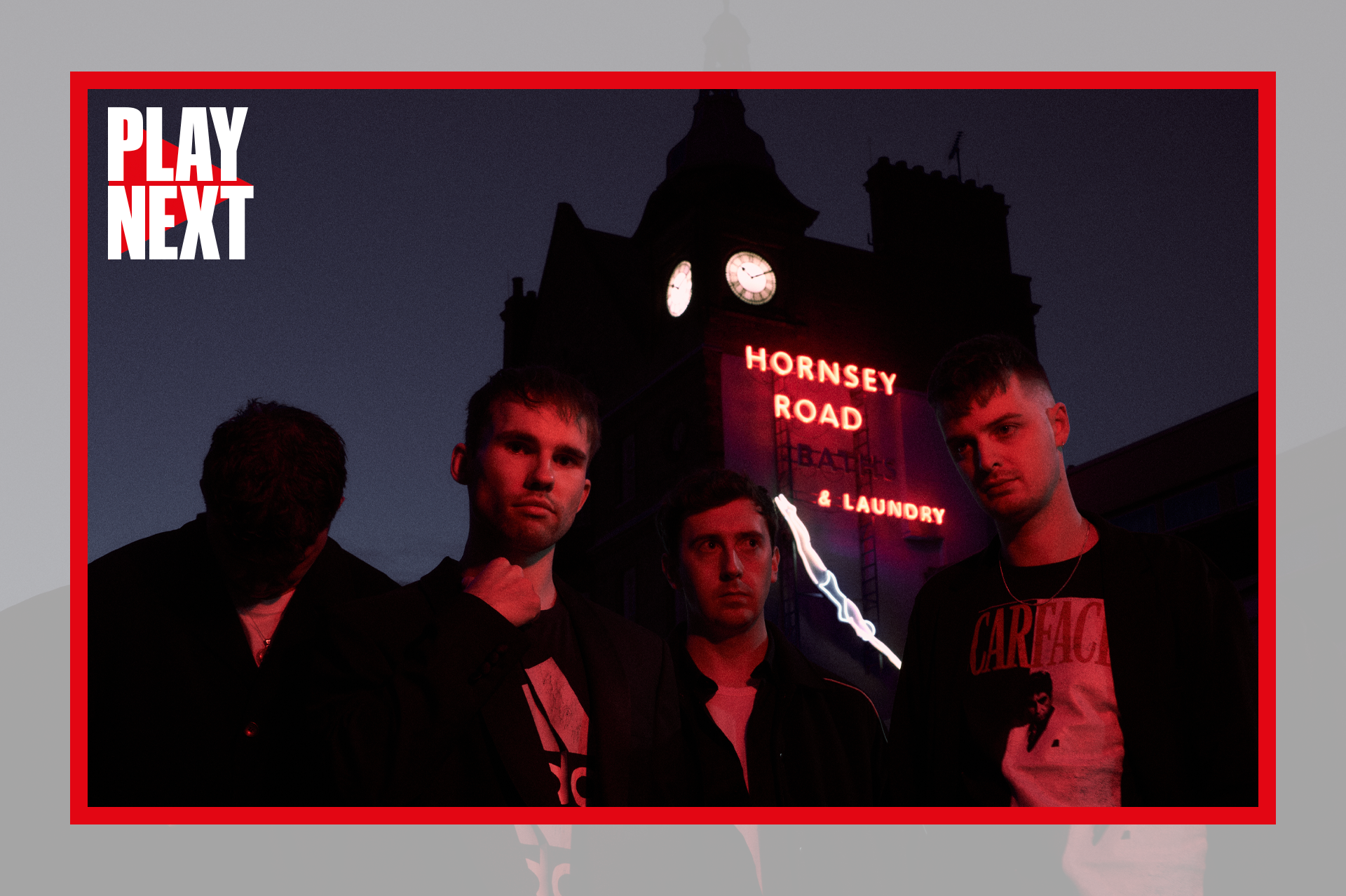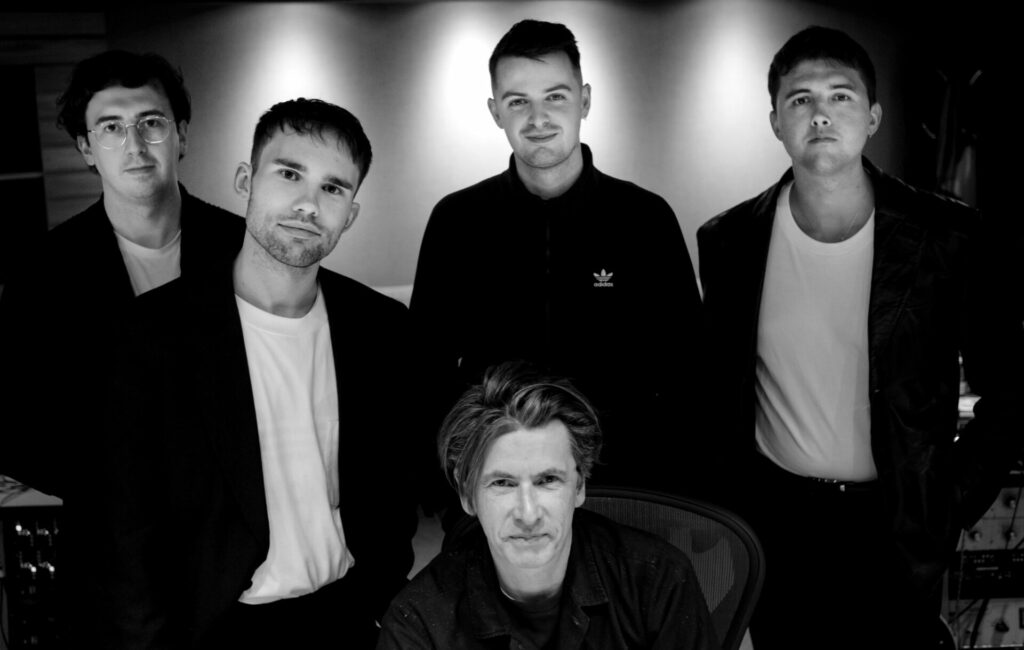Meet The Clockworks, the Galway rockers with a cinematic vision
The four-piece moved to London in search of success - and cut their ambitious debut album at Abbey Road
By Joe Goggins

“We haven’t been sitting around with a finished album, waiting for the right moment to put it out. We’ve taken our time. It’s all been very deliberate,” says The Clockworks’ James McGregor.
The Galway man’s summary of his band’s slow burn to their debut album is one spoken like a man with a vision. In fact, there is an intense single-mindedness about all four members of The Clockworks, one reflected in their unanimous decision, five years ago, to leave their native Galway for the bright lights and industry opportunities that London had to offer. Since, they’ve worked diligently to build a fanbase and develop their sound, gradually evolving into the band they wanted to be as they watched such Irish contemporaries as Fontaines D.C. and The Murder Capital do likewise, and meet with international success.
The Clockworks have a similar post-punk ferocity to those bands, especially live, but have forged a creative path all their own on a searingly ambitious debut album, Exit Strategy. A concept album with two distinct sides – the A-side is ‘Galway’, the flip side ‘London’ – its thirteen songs have roots in the reality of their own experiences but are elevated to another level entirely by McGregor’s feverish imagination, which allows him to paint lurid portraits of heartbreak, social media-induced anxiety, paranoia, infidelity, illegal activity and a failed escape to Australia, refracted through the prism of colourful characters including mob bosses, feral youths and a drunken would-be Jesus. To get the inside story on a recording process that took them to Abbey Road under the tutelage of Bernard Butler, we spoke to McGregor, along with drummer Damian Greaney.
What’s the story behind your move from Galway to London?
McGregor: We’d already been playing together for a while; three of us are friends from school, so we’d been playing together forever in some form or other, and then the current line-up of The Clockworks came together in, I think, April of 2018. And basically we made a promise. There’s a venue in Galway called the Róisín Dubh, and we made a pledge to each other – first, that we’d sell out the room upstairs, which holds ninety people, and then, that we’d sell out the downstairs venue, which has a 300 capacity. Once we’d done that, we’d head to London to seek our fortune. In May of that year, we sold out upstairs, and then in October, the room downstairs. So, after that, London was the dream.
Greaney: I think a big draw for us was the connections you can make in London, the opportunities there are, the people you can meet. We would definitely spend plenty of time in Galway sitting around thinking, “if only there’s loads of venues here with new bands playing,” or “if only there was a radio station we could play a session for,” and when we got to London those things were available to us, and we had to remind ourselves not to take it for granted. We made sure we got out there and kind of doorstepped people, and tried to be everywhere all at once to get the word out.
How much has London gone on to shape The Clockworks?
McGregor: The move itself has shaped us for sure. It’s difficult to say whether the city has shaped us musically, because it’s so eclectic and it’s difficult to pin down one sense of what London is as a musical city; there’s a whole jazz scene, there’s classical concerts on all the time, there’s an electronic scene. We moved around the time that all those bands were beginning to break through at The Windmill in Brixton, so maybe that scene was the thing that opened our eyes too the eclecticism of the music culture here. We always felt that moving to London would facilitate that.
Would it be fair to describe Exit Strategy as a concept album? Not everybody likes that term…
McGregor: Definitely. There’s a narrative running through it, and that was important to us. How we’ve conceptualised that is that we sort of viewed the album through the lens of it being a film, and imagined it that way. Specifically, trying to put across that feeling of your own life being a film that you’re the main character in, and reflecting that through the stories we’re telling in the songs.
It seems like you’re blending your own experiences, particularly the move to London from Galway, with fictional stories in these songs. What was the thinking behind that?
McGregor: I think that approach makes the songs more interesting. I like how it gives you the opportunity to bury the most vulnerable or sensitive themes within a fictional context, and yet you still find you can create some of the most outrageous stories from fact, and from life. We definitely played on that, one running into the other. Some songs are about different themes and different characters all at once, and we flip between them. I like playing with having a flippant or observational line sitting beside a vulnerable line. That juxtaposition is really fun.
Have you taken influence from film and other creative disciplines in the making of Exit Strategy? You did say that you pictured it playing out like a movie…
McGregor: Absolutely, yeah. I’m a massive reader, so that’s a big part of my writing. I think lyrically, some of the biggest influences are Zadie Smith and Virginia Woolf; something like Mrs. Dalloway, where there’s stream of consciousness, but also, you’re getting the perspective of different characters. And then, Hemingway, too, especially the iceberg theory and the focus on not giving too much away. That’s definitely shaped how I write.
And, obviously, yeah, films were important. Pulp Fiction was a big one for this, obviously, because it does the multiple narrative thing so well, and when it comes to the lyrics specifically, I was thinking of Goodfellas when lyrics that pop up earlier in the album then come up again later on. Scorsese was an influence; Taxi Driver, visually, we were envisaging that kind of world. That would come up in the writing, we’d be sitting around and say, “let’s try and imagine Taxi Driver with this one, let’s try to evoke that kind of imagery.”
Greaney: And that’s important to set the scene on these songs, because you might be talking about a guy driving around Galway with his mates, but as a young person, when you’re doing something like that, you feel like the central character in a movie. James’ style is very visual, so the rest of us almost imagine we’re scoring a scene, the lyrics are the dialogue and the music is the score.
You toured pretty extensively last year – did you find that your understanding of the songs, and your plans for recording them, developed the more shows you played?
Greaney: It was good that we had that enforced break from touring when COVID happened, because it encouraged us to write in different ways, to not just think about the live energy and, “how is this going to work live.” We started to write slower songs, and it freed us up. A song like ‘Westway’ is a good example of how we’ve developed as writers; we couldn’t have done that in the early days.
McGregor: But we were obviously keen to get back on the road and when we did, it was a good way to measure the new songs. I think we’d play about three at each show, and sort of rotate them in and out, and by the time we got to the end of 70-odd gigs or whatever it was, we really felt like some of them were working, and others had way more work to do on them.
Maybe this one doesn’t fit the album, maybe that one doesn’t feel right. And some of them felt great, and it wasn’t necessarily even a case of how the audiences reacted, it was about how they felt to us as we played them. I think we started out with a whiteboard with about twenty songs on it, so it was good to be able to be brutal and wipe a few of them off.

You recorded part of Exit Strategy at Abbey Road – is it a daft question to ask what the appeal of the place is?
Greaney: Well, obviously we were never going to say no to that opportunity. And there is very much that sense when you walk into the place for the first time; you can almost feel the importance of it. It did feel like you’d just landed your dream job and you were walking into it for the very first time. That brings with it a sort of weird pressure, where you feel like you’re required to do a good job because everybody else is – even the runners at Abbey Road are guys with degrees in sound engineering. Everyone’s such a professional, and you feel like you have to step up to the plate and really give back to the place.
McGregor: Yeah, it’s exactly that. There’s this ambient level of expertise and professionalism about the place, and then, on top of that, the lineage and the heritage of the place is always in the back of your mind. It creates this cocktail of pressure, but good pressure, without stress. It was really inspiring. But I think it suited the way we work now, which is less hurried and more willing to take risks. Shall we spend twenty minutes talking about an idea, or ten minutes trying it out? We’re not going back to the old way of working now.
And you had Bernard Butler there with you producing. His CV obviously speaks for itself – why was he the right fit for The Clockworks?
Greaney: I think it was that he was able to both challenge us, and remain empathetic and understanding of where we were coming from and what we were trying to do.
McGregor: The way he worked with us was that he was very good at paring everything down and helping us to understand how different parts made different songs tick. We’d do a take of a track and then he’d take us to one side and say, “just play it on a guitar” or “just run through the chords.” He has a very creative mind in that way.
It was an emotional process, all about intuition and getting to the heart and soul of the songs. He’s not the kind of guy who wants to discuss whether this is a major third or a minor sixth. He’ll say, “forget that – does it make you cry?” And if not, then go back in and get a take that does. He kept us on our toes like that, but it wasn’t a stress: its just gave us this vigour, this appetite to go and capture lightning in a bottle. Which, really, is exactly what making music should be.
Exit Strategy is available via Life and Times Recordings on November 10.
